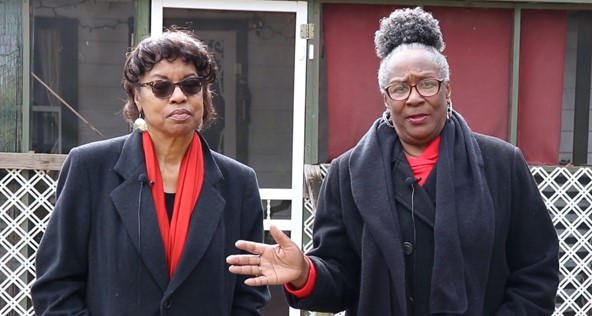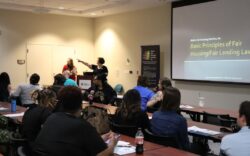The Athens-Clarke County Commission has passed the long-awaited Linnentown resolution, recognizing and apologizing for acts of “institutionalized white racism and terrorism” committed by the City of Athens and the University of Georgia against former Linnentown residents during the period of urban renewal.
Linnentown was a Black community off Baxter Street where high-rise UGA dormitories such as Russell and Creswell Hall now stand. In the 1960s, the City of Athens seized Linnentown from these Black families through eminent domain, paying them a small fraction of the value of their homes, which were destroyed. The land was then sold to UGA to make way for dormitories, parking lots and tennis courts.
This happened “through intimidation, weaponized code enforcement, inequitable property value judgments, controlled demolition by fires, forced tenancy and rent, tokenized Black representation, invasions of financial privacy and paternalistic relocation policies,” which caused Linnentown to be “effectively erased without a trace by the City of Athens and the University System of Georgia,” as stated in the resolution.
The passage of this resolution represents the culmination of more than a year of effort by former Linnentown residents and other community members trying to have their trauma and loss recognized by the institutions who perpetrated it almost 60 years ago.
Beyond recognition, the resolution also calls for redress for those affected by urban renewal more generally in Athens. Specifically, it calls for an on-site “Wall of Recognition,” historic designation for some remaining Linnentown homes which escaped the destruction, the creation of a local “Center on Slavery, Jim Crow, and the Future of Athens Black Communities” and for reparations for those affected by urban renewal across Athens.
The Linnentown Justice and Memory Committee, which Mayor Kelly Girtz established last year, will give recommendations on how reparations should be made. While the mayor and commission cannot give direct compensation to individuals due to the gratuities clause of the Georgia Constitution, reparations can instead include things like “affordable housing, economic development, telecommunication services, public transportation and public art.”
The commission hopes that these policies will provide “redress for past harms caused by urban renewal” and that they will “foster future reinvestment in historically underfunded and impoverished neighborhoods.” However, the local government does not have the power to create a body with actual authority over these matters, so for now, the decisions of the Linnentown Justice and Memory Committee will be made as recommendations only.
The resolution also urges the Georgia General Assembly to establish a similar body having actual power, which only the legislature has the ability to do.
In addition to reparations, the most controversial part of the Linnentown resolution may turn out to be the “Wall of Recognition,” which will explain the history of this dark chapter of Athens history to anyone walking through that part of campus. UGA has shown no interest in the Linnentown resolution or a memorial at that location; they even sent a private email to commissioners last year opposing it.
Commissioner Mariah Parker told APN that she prefers partnering with UGA to create the Wall of Recognition, but says it will be constructed with or without their support. Currently, the local government is making plans to put it on public land without UGA’s involvement, “lest the work be stalled indefinitely.”
Although the vote to pass the Linnentown resolution was unanimous, not all commissioners voted yes without reservations. Commissioner Patrick Davenport gave a heartfelt speech just before the vote criticizing white progressives while recalling instances of white supremacy and violence happening in the US in recent years, such as the murders of George Floyd and Trayvon Martin.
“To the white people, I don’t want nothing from you. I don’t want your guilt. I don’t want your pity. I don’t want reparations. Because what’s the point? What’s the point when tomorrow, we’re gonna have someone put a knee to my neck? What’s the point when I can’t even walk down, in my own neighborhood, with a bottle of tea and a bag of Skittles, because someone fears me because of the color of my skin?
“The biggest thing you can do for us, or for me, I’m not speaking for all Black people, is to go to your discriminating, bigoted, racist brothers and sisters and just have a conversation with them. The conversation shouldn’t be held with us, it should be held with white people.”
Commissioner Russell Edwards also had reservations about the resolution last year due to the inclusion of the word “terrorism” to describe the city of Athens and UGA’s actions. However, he has changed his mind and now fully supports it.
“I was wrong,” Edwards said. “It was an act of terrorism. It was an act of white supremacy.”
Parker, who assisted Linnentown residents in writing the resolution, kept the focus on their work, giving them full credit for the resolution’s passage. “To everyone who spoke up and pushed and who refused to take no for an answer, I commend you. We are a better government as a result of your work,” Parker said.
This article originally appeared at Athens Politics Nerd.
Like what you just read? Support Flagpole by making a donation today. Every dollar you give helps fund our ongoing mission to provide Athens with quality, independent journalism.










